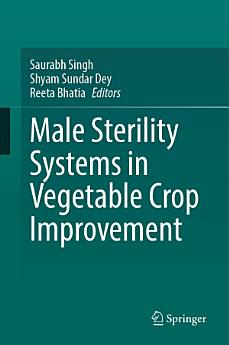Male Sterility Systems in Vegetable Crop Improvement
About this ebook
This book is resourceful for the researchers, students, scientists, teachers and private players interested in hybrid vegetable seed industry.
About the author
Dr. Saurabh Singh is currently working as Teaching cum Research Associate at Rani Lakshmi Bai Central Agricultural University, Jhansi, India. He has more than seven years of experience on vegetable breeding. His main research interests are genetic improvement of vegetable crops using genomics, molecular breeding, genome editing and doubled haploidy. Exploiting genetic mechanisms of sporophytic self-incompatibility and cytoplasmic male sterility for heterosis breeding are his main areas of expertise.
He has published various research and review articles in reputed peer-reviewed journals. He is the recipient of Dr. B. R. Barwale Young researcher award in Horticultural Biotechnology for doctoral research by Indian Academy of Horticultural Sciences (IAHS). He is a life member of national professional societies like Indian Society of Vegetable Science (ISVS), Indian Science Congress Association (ISCA) and annual member of International Society for Horticultural Science (ISHS), Belgium.
Dr. S.S. Dey is currently working as Senior Scientist at Division of Vegetable Science, ICAR-Indian Agricultural Research Institute, New Delhi since 2008. He is associated with genetics and improvement work of cucumber and cauliflower for last 15 years. He has published more than 65 research papers in well-reputed peer-reviewed journals. His most significant research contributions are development of first indigenous cytoplasmic male sterile (CMS) lines and development of F1 hybrids using these lines in cauliflower and cabbage. He was awarded prestigious Indo-Australia Early Career R&D Visiting fellowship by Indian National Science Academy (INSA) for a period of 1 year. Very recently, he was also honored with prestigious NAAS Associate Award.
Dr. Reeta Bhatia is currently working as Senior Scientist in the Division of Floriculture and Landscaping, ICAR-IARI, New Delhi, India. Presently, she is working on the genetic improvement of gladiolus and marigold using modern breeding strategies including male sterility systems. For the past 15 years, she has conducted research on development of doubled haploids in Brassica vegetables through the microspore embryogenesis technique. Her team has developed three CMS (Ogura) lines (Ogu1A, Ogu2A and Ogu3A) in cauliflower for the first time in India. During her Post-Doctoral program at UWA, WA, Australia, she undertook the research on “Genome wide association of NBS-LRR genes in B. oleracea L”. She has been awarded with DP Ghosh Young scientist award by Indian Academy of Horticultural Sciences. She has published more than 60 research papers in journals of high-repute.







